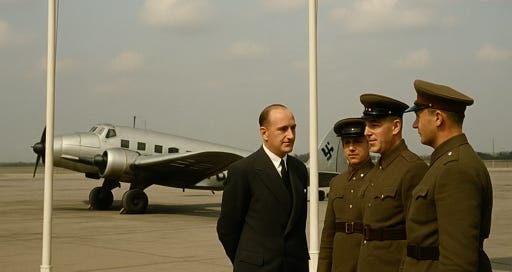Hitler Was Guilty of Starting WWII
The Revisionist Historian's Mandate: Follow the Evidence Wherever it Leads
Retrospective Rationalizations of Hitler’s Criminality are Built on Sand
By Michael Hoffman • www.RevisionistHistory.org
[Reading time approximately 30 minutes]
David Irving and Darryl Cooper offer versions of the thesis that Hitler made reasonable peace overtures to Britain and was rebuffed. Mr. Irving approaches the subject as a documentarian with archival backing, while Mr. Cooper functions as a journalist popular among audiences disillusioned with official Allied narratives.
Their perspectives have parallels in the work of Pat Buchanan (Churchill, Hitler, and the Unnecessary War), John Charmley (Churchill: The End of Glory), and Peter Hitchens (The Phoney Victory), among others. They largely chronicle—correctly— Winston Churchill’s crimes and war-mongering.
This study however, is centered on events during the months of August, September and early October 1939, when Neville Chamberlain was Prime Minister, immediately prior to, and in the initial wake of the beginning of the Second World War.
THE DECLINE OF WORLD WAR II REVISIONISM IN THE 21st CENTURY
I have been engaged with the revisionist history of the Second World War since my youth in the 1970s. It was formerly a movement of unfettered inquiry inspired by scholars of the caliber of James J. Martin (1916-2004] — Jeff Riggenbach’s outstanding biographical sketch of Dr. Martin and the revisionist movement is indispensable.
Martin was the brilliant érudit who in 1953 wrote the pioneering history of anarcho-libertarianism in the United States: Men Against the State, as well as the essential two-volume American Liberalism and World Politics, 1931-1941 published by Devin-Adair in 1964, and other classics (Beyond Pearl Harbor: Essays on Some Historical Consequences of the Crisis in the Pacific in 1941 [1981].
The unofficial standard of “Doc Martin” (as he was known) was “follow the evidence wherever it leads” come hell or high water; whether you lose supporters or gain them, whether you’re fired from your position or promoted to an endowed chair at Oxford. His cavalry-charge straight through the massed forces of consensus contributed significantly to the revisionist exposition of the war crimes of Franklin D. Roosevelt, Harry S. Truman and Churchill.
Revisionism by its nature is anti-dogmatic. One revises one’s comprehension of the past predicted on the perennial stream of newly unearthed revelations from primary and heretofore obscure secondary sources—the general’s diary found in an attic, the sheaf of correspondence from a key diplomat discovered in a dusty corner of an archive; the neglected, privately printed book by an eyewitness, and so forth.
Of late, the noble follow-the-evidence mandate, has, with some exceptions, been replaced by an unwritten maxim: the rehabilitation of the reputation of Adolf Hitler is the sine qua non of Second World War revisionism. This is a radical departure from the bedrock revisionist mission. To varying degrees, a majority of what passes for World War II revisionism today is ideologically tilted toward defending, to one degree or another, Hitler’s record. Revisionists who are not on board are ostracized and boycotted.
Like its enemies, much of World War II revisionism in its tattered 21st century remnant privileges conformity over free inquiry and debate. and suppresses dissenting viewpoints. This has been the fate of this writer’s book, Adolf Hitler: Enemy of the German People. It is apparently too explosive to review, even critically, having been accorded the silent treatment.
To be loathed by Communists, Zionists, Talmudists, adorers of Churchill and defenders of Hitler, is a badge of honor.
Open-minded inquiry remains the gold standard of authentic revisionism, dogma’s most formidable enemy.
Stalin’s Alliance with Hitler
The 80th anniversary of Victory in Europe (VE) Day, marking the end of World War II in the Atlantic Theater on May 8, 1945, was commemorated across the United Kingdom and Europe.
In the wake of the vainglorious goodness Vladimir Putin assigned to the Stalinist USSR’s victory over Hitler’s Germany my thoughts turn first to Stalin’s alliance with Hitler, and then to the events immediately preceding the start of the misnamed “Good War,” in August 1939.
Of late, on the Right, Hitler is increasingly exonerated of the charge of having initiated it. It is certainly true that Britain did not work enough for peace and that Churchill’s network actively conspired against it. Do these facts absolve or even mitigate what Hitler did to Poland in September and October 1939, and what his alliance with the Soviets cost Lithuania? Let’s examine the evidence.
Keep reading with a 7-day free trial
Subscribe to Michael Hoffman's Revelation of the Method to keep reading this post and get 7 days of free access to the full post archives.



